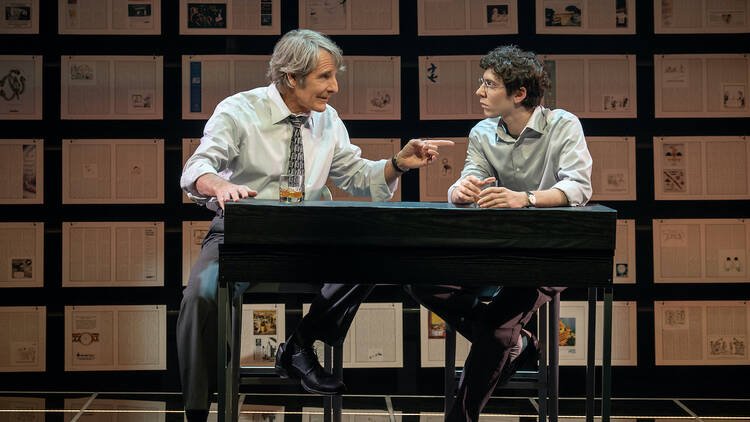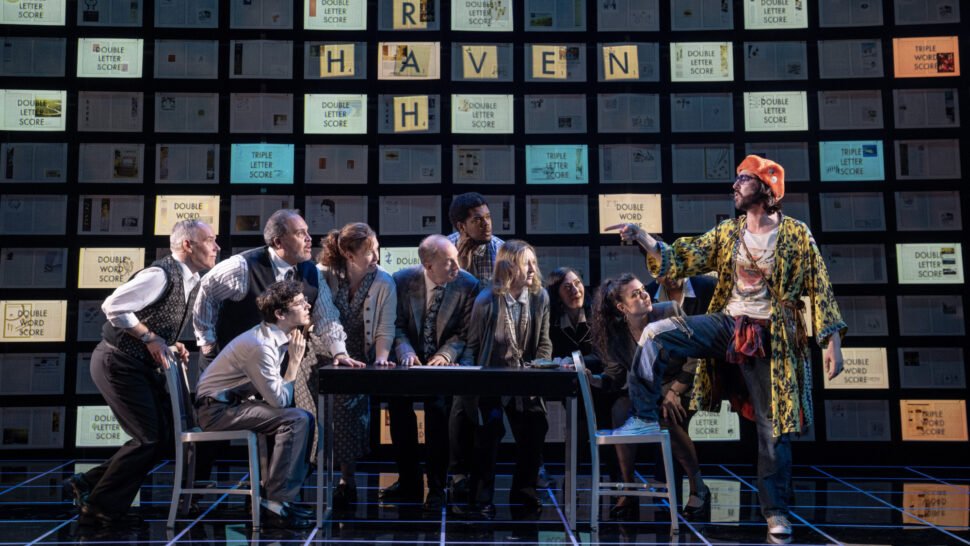The Connector
Conrad (Scott Bakula) offers journalistic advice to Ethan (Ben Levi Ross).
March 16, 2024
A reporter’s duty, according to the Society of Professional Journalists, is to “seek truth and report it.” A critic’s duty is to evaluate and analyze a creative work, offering thoughts on its merits and flaws free of personal bias. So how does a journalist who writes about musical theater write an impartial review of a musical about journalism?
The answer, this critic thinks, is one cannot. So I will not pretend to be wholly impartial to The Connector, the new musical playing at the Robert W. Wilson Theater. With a score by Jason Robert Brown and a book by Jonathan Marc Sherman, The Connector was inspired by the journalistic fabrications of Stephen Glass, a reporter at The New Republic who falsified many of his articles’ topics and sources. The musical chronicles the rise and fall of Ethan (Ben Levi Ross), an ambitious young reporter who secures a coveted spot on the titular magazine’s staff. Fresh out of college, Ethan begins producing stories so wild and vividly reported that seem too good to be true. Spoiler alert – they are.
It’s inevitable that a musical about the Fourth Estate will pulse with sincerity and nostalgia. And that might just be its problem. Despite a talented cast, swiftly directed by Daisy Prince, the musical fails to – forgive me – connect with a journalist from the present day.
Depicted by its period-perfect costumes, The Connector is set in the late 1990s, when journalism was free from the obligations of the Internet. SEO and social media didn’t exist, and readership depended on subscriptions, rather than clicks. Writers were paid living wages and given weeks or months to prepare their stories. A less nostalgic aspect of the time was the lack of diversity in the newsroom, which was dominated by white men – of which Ethan is one and to which he can credit his rapid hire and affectionate mentorship from his editor, Conrad O’Brien (Scott Bakula, affable and paternal).
Rather than write Ethan as the narrator, or present a memory play from Conrad’s past, The Connector is narrated by Robin Martinez (Marissa Medina, the understudy and excellent), a longtime copy editor who strives to write for the magazine and, a Latina woman, is overlooked. Several scenes depict her asking Conrad if he has read her latest piece, only to be brushed aside as he departs for happy hour with Ethan.
Skeptical of Ethan’s skyrocketing success and seemingly effortless charm, Robin guides the audience through his rapid-fire rise and fall. Her song “Cassandra,” a soaring anthem of the frustration about the “male and white and unenlightened” decision-makers, was especially cathartic for this critic, who has been the only woman at many editorial meetings. (It is worth noting that the show’s creators, Brown and Sherman, are both male and white.)
The ensemble of The Connector
Instead, to Robin’s frustration and bewilderment, Ethan ascends by way of his people-pleasing tendencies and ability to reflect exactly what people want to see. Only the magazine’s fact checker, Muriel (an outstanding Jessica Molaskey) is immune to his charms and suspicious of his talents. Muriel demands names and phone numbers of Ethan’s sources, but Conrad is happy to take his star reporter at his word. Perhaps as an apology to the character, Muriel is given the best song in the show, as she muses on her need for facts and truth. More quiet and reflective than much of the 90’s-infused score, its emotional impact is powerful.
But that could be my own emotions talking. As an elder millennial who matriculated Jschool before the Facebook newsfeed existed, the idea of a staff fact checker – let alone one described as a “legend” – made me as nostalgic for the nineties as Conrad was for writing New Journalism with Tom Wolfe in the sixties.
Ethan’s stories are brought to vivid life through Brown’s score, a diverse combination of pop, jazz and classic musical theater. “Success,” performed by an energetic Max Crumm, is wildly entertaining, and Fergie Philippe’s performance as an off-the-record political source, brings the adrenaline rush reporting inspires to the stage. The incessant crescendo and accelerando in “Western Wall” represent Ethan’s house of cards toppling around him on Beowulf Boritt’s versatile set, which evokes nostalgic thoughts of actual newsrooms, and Jeanette Oi-Suk Yew’s lights and projections communicate the urgency and anger.
One writing rule that is too frequently broken is “show, don’t tell.” The Connector doesn’t exactly break this rule – it shows a great deal – but what it shows is often unnecessary and ineffective. We see the stories Ethan creates, but we don’t see how they are created or why. Instead of a fully-formed character, Ethan serves as a vehicle through which the story is told. We never learn why he lies or what he hopes to achieve by doing so. We see the stories themselves, but none of the work that goes into them.
Much of the score is repetitive, and songs feel like missed opportunities. While Bakula’s plaintive musing on the news industry, “Now What?” is perfectly fine, Conrad suffers without more emotion and insight. Rather than pleasant musings, Conrad deserved an anthem of anger and despair following Ethan’s revelations. His climactic decision to resign and close the paper at least deserved a verse or two. And the questions the musical does inspire – reflections on the ethics of reporting and the narcissism of how and by whom a story should be reported – do not receive the focus they deserve.
Sadly, those reflections are nothing new. Comparisons of present-day media – influencers, branded content, sensationalism and prioritization of efficiency over accuracy – are all too familiar. Distrust of the media has been a staple of entertainment since Citizen Kane. The Connector tells its story loudly and vividly, but it’s hardly a new story to tell.
Instead, the final song is a rueful reflection by Ethan on the existence of truth. Dimly-lit and alone onstage, the moment is clearly intended to evoke existential musings. But, like much of present-day journalism, it needs a rewrite.


